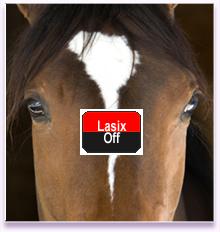Lasix has become a widely used medication over the past thirty years. Lasix® is the brand name for the medication furosemide, which is a potent diuretic that can lead to profound diuresis with water and electrolyte depletion if taken in excess. When looking at a race day program, track patrons will see that nearly every horse that is raced is being given lasix. Lately, there has been quite a bit of controversy over the use, or overuse of lasix.
It all began back in the 1980's, when lasix, or furosemide, began being administered to racehorses as a means to prevent Exercise Induced Pulmonary Hemorrhage, or EIPH, more commonly known as bleeding. This is a naturally occurring problem in horses engaged in strenuous activity. During exertion, internal fluids place excessive pressure on the horse's lungs, causing the small capillaries within to break. This results in blood being dispersed in the lungs, which ultimately gets exhaled through the horse's nostrils. The visible blood is what gives EIPH affected horses their common name, "bleeders".
Lasix is supposed to reduce the problem of EIPH by reducing the amount of fluid in the body. Being a diuretic, horses will lose up to 20 pounds of fluid after being administered the medication. However, researchers are quick to point out that this is not a cure and even the reduction in the effects of EIPH due to lasix treatment are unclear. Bleeding is thought by some to be a result of high blood pressure. Many horsemen believe that lasix will improve a horse's performance, but that is something I have yet to notice.
Do so many horses actually need lasix? Doubtful. While the use of lasix is a common practice in the United States, other countries such as the United Arab Emirates, do not allow it. Many horses from the U.S.A. travel to Dubai every year for the Dubai World Cup Night of Races. The featured event, The Dubai World Cup, is an invitation-only race, in which the top horses from their respective countries around the world are invited to compete against one another. American horses have won seven of the twelve runnings of this highly prized cup, including Cigar, Silver Charm, and Curlin. Numerous others have placed here and in 2005, the first five finishers were from our home country. If lasix does improve performance, why were these great athletes able to conquer the world, so to speak, without lasix? If they did not need it in Dubai, why do they need it here?
I read an article some time ago where the author claimed that 90% of all racehorses bleed to some extent. Did this individual have every animal checked by a veterinarian via endoscope to determine these figures, or did he just look at the local entries and see that 90% of the horses competing that day were running on lasix. My guess is the latter.
There was a study done in Australia that involved 744 thoroughbreds that were graded 0-4, where a "1" was having a few flecks of blood here and there and a "4" equaled 90% of the animals windpipe was coated in blood. Horses with a grade one were just as likely to compete as well as horses that were a grade "0" (no evidence of bleeding whatsoever). Of the 744 horses tested, 332 were rated as "0". Four hundred twelve exhibited some bleeding, of which 273 were rated a grade 1 or less, and of the remaining 139, 101 had a grade 2, 25 were a grade 3, and only 13 were grade 4. This study tells me that only a small percentage of horses actually need to be treated with lasix, if it is in fact effective.
Many horsemen use lasix as a preventative measure, but since researchers are uncertain as to whether or not it actually prevents bleeding, then why use it? Due to the multitude of side effects lasix causes (e.g. dehydration, muscle fatigue, and cramping), wouldn't a horse be better off without it? When asked why they choose to administer lasix, the common response is because everybody is doing it.
I have trained hundreds of horses over the years and have only had two confirmed bleeders. One of them was 5 years old before he began showing signs of EIPH. Once he was placed on lasix, his performance deteriorated. Many horses come to my barn from other trainers who have them racing with lasix. I have often found that most of them do better without it. It is my belief that in most instances, the use of lasix is a "monkey see, monkey do" situation. Stricter guidelines need to be implemented to stop this rampant practice and absolutely no first time starters should be allowed to run on lasix.
When a horse or any athlete is injured, the problem is treated so the injury will heal. The same should be done with EIPH. There are supplements on the market to strengthen the capillaries. Treat the problem, not the symptoms.
Sharon Soileau is an ex-jockey turned horse trainer. After enjoying a brief riding career, she passed her trainer's test in 1979, then won with the first horse she saddled. She continues to work as a certified trainer in Louisiana.


